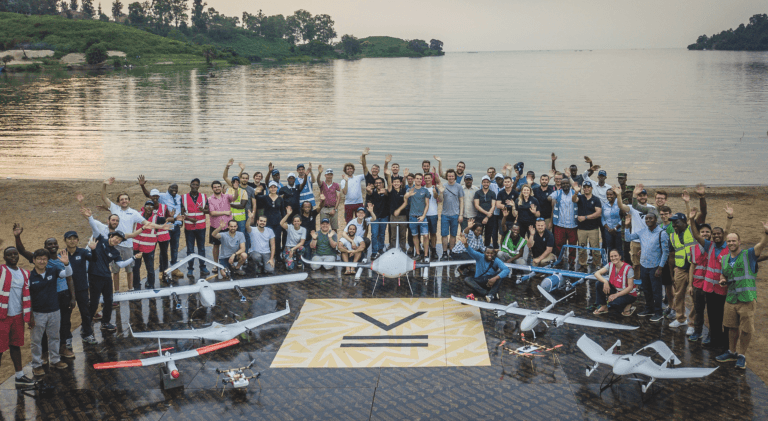AFRICA is on the cusp of a major logistical evolution. Drones, once considered a niche technology, are emerging as a vital force in cargo operations— reshaping how goods are delivered across the continent.
For instance, Zipline drones have already delivered over five million Covid-19 vaccines and medical supplies across rural Ghana and Rwanda, cutting delivery times from hours to minutes. Whether it’s crucial medical supplies reaching remote clinics or high-value commercial items moving between urban hubs, drones are poised to enhance last-mile and middle-mile delivery in ways few could have predicted.
A catalyst for change
We at the African Drone Forum (ADF) share a common mission: to create a thriving ecosystem where drone operations can be conducted safely, sustainably, and inclusively. From the start, we recognised that Africa’s diverse logistical landscape—including hard-to-reach rural areas and regions where traditional transport faces delays—highlights the immense potential for drone solutions.
Consequently, last-mile delivery emerged as a natural focus for testing and validating drone use cases. In Malawi, drones have successfully delivered essential medicines and vaccines to remote clinics within 20 minutes—a journey that would have taken hours by road. Yet, middle-mile delivery holds equally transformative potential. This stage involves transporting goods between regional hubs and distribution centres and is critical for optimising the broader supply chain.
By deploying cargo drones with extended range and enhanced payload capacities, such as Wingcopter models capable of travelling over 100 kilometres with significant payloads, African countries can decrease turnaround times, reduce operational costs, and improve reliability. When successfully integrated with existing modes of transport, drones promise to create a new standard of efficiency in moving goods across diverse terrains and borders. Pan-African vision Crucial to our efforts at the ADF is the spirit of collaboration. From government bodies and civil aviation authorities to tech startups, cargo carriers, and humanitarian organisations, we foster dialogue among all stakeholders.
This alignment ensures that we can develop robust regulations and business models that catalyse drone operations without compromising safety. Countries such as Ghana, Kenya, Malawi, and others have already blazed trails by welcoming drone initiatives for healthcare and humanitarian relief. In Ghana, Zipline’s public-private partnership with the government has expanded drone healthcare delivery to serve over 15 million people, while Malawi’s UNICEF Drone Corridor has provided a platform for testing innovative humanitarian applications. Over time, these initial deployments, such as Kenya’s use of drones for urban mapping in Konza Technopolis and Madagascar’s drone-based reforestation projects, have helped shift drones from experimental curiosities to tangible, valueadding assets for communities and businesses.
Advancing the African drone frontier
One of our most anticipated endeavours is ADF 2025, scheduled for July. During this gathering, we will bring together policymakers, innovators, logistics professionals, and community leaders to discuss the latest breakthroughs in drone technology and drone-enabled cargo solutions. This will be a critical platform for sharing knowledge, showcasing best practices, and guiding the future of drone integration across the continent.
On the agenda Regulatory cooperation: Harmonising drone policies to enable seamless, safe, and cost-effective operations—building on the work of the African Union and ICAO, which are developing a pan-African drone regulatory framework. Technology frontiers: From next-generation drone designs and propulsion systems to software innovations that can enhance route planning, communication, and data analytics.
Business models: How can African entrepreneurs, startups, and established logistics companies secure the funding, training, and partnerships to scale drone operations sustainably?
Community engagement: Ensuring that drone initiatives address local needs, create jobs, and deliver tangible social and economic benefits without negatively impacting the environment. We believe ADF 2025 will be an unparalleled opportunity to align leaders from across the spectrum—public and private—on a roadmap for accelerating drone adoption. Our ultimate goal is to foster economic growth and social development, ensuring that no corner of Africa remains disconnected from the rest.
Sustaining the momentum
Looking ahead, the African Drone Forum remains committed to amplifying the potential of unmanned aerial vehicles in cargo logistics. The synergies between last-mile and middle-mile drone deliveries are clear: together, they can form the backbone of a robust, interconnected supply chain that meets Africa’s growing demands. Realising this vision, however, requires more than technology alone.
It demands an integrated approach that includes policy frameworks, skill development, public-private partnerships, and above all, long-term investment. For example, the African Development Bank has invested heavily in drone corridors in Malawi and healthcare delivery systems in East Africa, demonstrating the importance of sustained funding.
Each of these components is essential if we are to move beyond pilot projects and pilot corridors and expand drone operations to every region that needs them. To members of the air cargo community and beyond, we extend an invitation to join this journey. Your involvement—whether through direct collaboration, knowledge-sharing, or financial investment—can help propel drone-enabled cargo solutions to new heights.
Together, we can ensure that Africa’s logistics networks evolve with resilience, efficiency, and inclusivity. Join us at ADF 2025 this July, and be part of a revolution in African cargo. More information at www.africandroneforum.org




